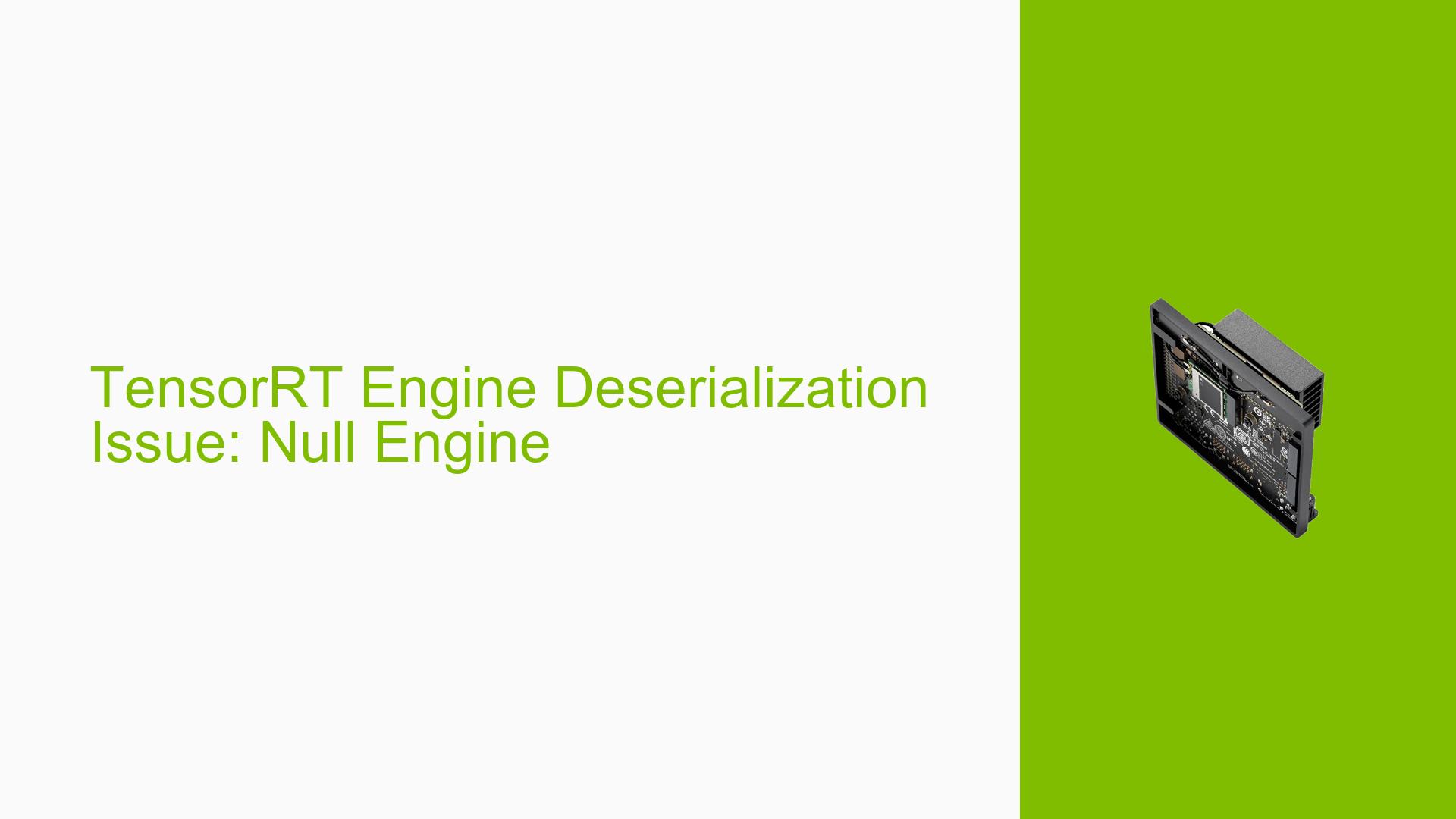TensorRT Engine Deserialization Issue: Null Engine
Issue Overview
The issue discussed in the forum revolves around a TensorRT engine deserialization failure when users attempt to load a TensorRT engine file (.trt) using the Nvidia Jetson Orin Nano Developer Kit. Users report that the engine variable becomes None during the deserialization process, leading to an error message stating "The engine failed to load." The problem typically occurs after users have created a TensorRT engine file and are trying to run it in their applications.
Symptoms and Context
- Symptoms: Users encounter a
RuntimeErrorindicating that the engine could not be loaded. - Context: This issue arises specifically during the execution of a Python script that attempts to deserialize a TensorRT engine file. The users have confirmed that the TensorRT file exists and is not empty.
- Specifications: Users are operating with:
- JetPack version: 5.1.2-b104
- CUDA version: 11.4
- cuDNN version: 8.6
- TensorRT version: 8.5.2.2
- Frequency: The issue appears consistently when attempting to load the engine.
- Impact: This problem significantly hampers the user experience, preventing them from utilizing their trained models effectively.
Possible Causes
-
Plugin Registration Issues:
- If custom plugins were used during the creation of the TensorRT engine, they must be registered before deserialization. Failure to do so results in a deserialization error because the necessary plugin creators are not found in the registry.
-
Engine File Compatibility:
- Using an engine plan file across different models or versions of devices can lead to performance issues or errors, as indicated by warnings in verbose logs.
-
Serialization Errors:
- The error log indicates serialization assertions failing, which suggests that there may be issues with how the engine was serialized or created.
-
Version Mismatches:
- Incompatibilities between CUDA, cuDNN, and TensorRT versions can lead to unexpected behavior during engine loading.
-
File Corruption:
- If the TensorRT file is corrupted or improperly generated, it may lead to failures in deserialization.
Troubleshooting Steps, Solutions & Fixes
-
Check Verbose Logs:
- Enable verbose logging for TensorRT to gather detailed information about why deserialization is failing.
trt_logger = trt.Logger(trt.Logger.VERBOSE) -
Register Plugins:
- Ensure that any custom plugins used during model creation are registered before attempting to deserialize.
trt.init_libnvinfer_plugins(trt_logger, "") -
Verify File Existence and Integrity:
- Confirm that the
.trtfile exists at the specified path and is not empty.
import os if not os.path.exists(trt_file_path): raise FileNotFoundError(f"The TensorRT file does not exist: {trt_file_path}") - Confirm that the
-
Recreate Engine File:
- If issues persist, consider recreating the TensorRT engine file with updated settings or configurations.
-
Check Version Compatibility:
- Ensure that all software components (CUDA, cuDNN, TensorRT) are compatible with each other and with JetPack.
-
Test on Different Hardware:
- If possible, test the same code on another Jetson device or environment to isolate whether it’s a hardware-specific issue.
-
Consult Documentation and Updates:
- Regularly check for updates to JetPack and related libraries that might resolve underlying bugs.
-
Community Support:
- Engage with community forums for additional insights or similar experiences from other users who may have resolved this issue.
Recommended Approach
Multiple users have reported success after ensuring proper plugin registration before deserialization attempts; thus, this should be prioritized as a first step in troubleshooting.
Unresolved Aspects
Further investigation may be needed regarding specific plugin compatibility issues and whether certain plugins require additional configuration steps that were not initially documented in user guides.
